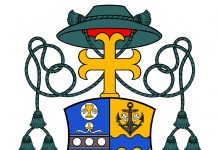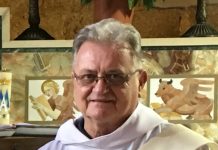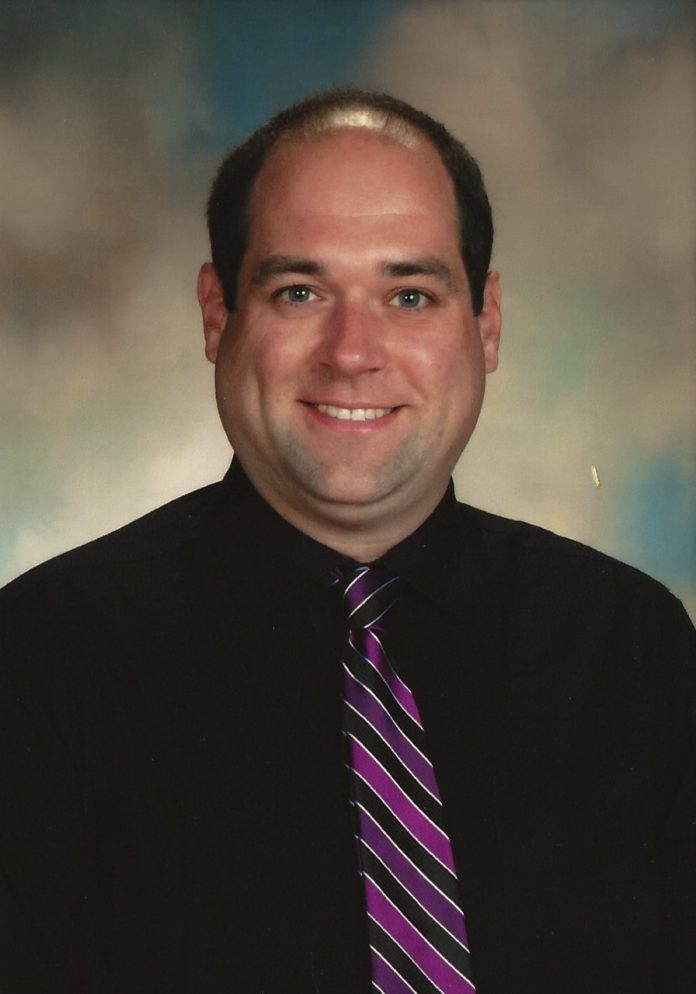Column by Jonathan Nagy
Saint Thomas Aquinas was perhaps the most prolific theologian in Catholic Church history. His Disputed Questions on Truth, Summa contra Gentiles, and his unfinished masterpiece Summa Theologiae contain some of the deepest analysis of Catholic beliefs. He is also credited with writing the lyrics to well over one hundred hymns including Adoro te devote, Tantum Ergo, Panis Angelicus, Pange Lingua Gloriosi, and O Salutaris Hostia. Named a Doctor of the Church by Pope Leo XIII, his brilliant writings continue to influence the Church today. He even had a vision at one point in his life of Jesus saying to him, “You have written well of me, Thomas.” However, in the end, even Thomas knew that his writings paled in comparison to the great power of God.
Towards the end of his life, while still working on the Summa Theologiae, Thomas had another vision, which most believe was a look into Heaven’s glory. Thomas remarked to his fellow Dominican monks, “I can write no more. All that I have written seems like straw.” The brilliant works he composed did not even compare to what God had just revealed to him. After reading some of Saint Thomas Aquinas’ works, it is both difficult and wondrous to believe that what he wrote does not even scratch the surface of truth. That day of his vision, only a few months before his death, Thomas stopped writing. A fellow monk remarked, “Thomas not writing is the same as Thomas not breathing.”
Thomas was not making a retraction of any of his writings. Instead, he was revealing that as much as we as humans believe we know everything, nothing could be further from the truth. Understanding that there is always more to know, especially when speaking of God, is the reality of education. It is no coincidence that Pope Leo XIII also named Saint Thomas Aquinas as the Patron Saint of Catholic Educational Institutions in 1880.
A few years ago, I was privileged enough to visit the Church of the Jacobins in Toulouse, France, a former Dominican monastery. It is here that the earthly remains of Saint Thomas Aquinas are interred. As I knelt praying a few feet away from the body of one of the greatest Catholic writers in history, I was overcome with so much emotion. It caused me to block out everything else around me to the point where I almost missed the group of students I was chaperoning as they moved on to the next location. Looking back, I find that experience, and the life of Saint Thomas Aquinas, as continued inspirations for me as a Catholic school teacher and administrator.
In that 800-year-old Gothic masterpiece, I was joined by pilgrims and tourists from all over the world. My comprehension of foreign languages consists of Church Latin and a few key words in other languages, but yet, I did not need to understand what the others in that building were praying to know that they were praying. I heard prayers in French, Spanish, Italian, English, and even Russian. A group of nuns were on the far side of the church delicately singing a hymn, and hundreds of others who might not even have been Catholic or even religious, filed through the building, appreciating the architecture and the saint interred in the altar. I believe that what was happening in that moment is exactly what Thomas Aquinas would have wanted; people finding God through him.
The same could be true of all Catholic educators. Our goal, plain and simple, should be to help our students find God through us. Scoffers may wonder how one can find God through all of the various subjects taught in schools, but just like Thomas, if our eyes are open enough, we can see God everywhere. Some subject areas are easier to find God’s influence, such as in art, music, history, and literature. Others, like math and science, seem to be more difficult. Make no mistake, God is there as well.
One of the main points of the Enlightenment Era in Europe during the 18th century was the belief that humans can solve any problem. Some of the greatest philosophers and scientists set out to answer centuries-old questions and attempted to disprove religion. Mathematician and Philosopher Rene Descartes spent his life seeking answers and truths in the natural order of life. In the end, he said, “I have concluded the evident existence of God, and that my existence depends entirely on God in all the moments of my life, that I do not think that the human spirit may know anything with greater evidence and certitude.” In all of his scientific and mathematical discoveries, one truth prevailed; that God is real, and our existence is because of Him.
Just like Thomas Aquinas seeing how much his writings did not compare to the power of God or Rene Descartes spending his life looking for the proof of God, we also may not see how what we are doing in Catholic schools directly leads our students closer to our Heavenly Father. To further understand that concept, we must go beyond the material being taught and look at who is teaching our students and how they are doing it.
The environment of a Catholic school is very different from any other type of school. The differences go far beyond the visible elements of crucifixes, prayers, and icons. One cannot help but feel the presence of God when walking through the building, whether it is full of people during the day or a quiet moment in the evenings. I spend many quiet evenings during the school year and quiet days during the summer giving families tours of our school in hopes that they also will feel the difference and know it is the right choice for their children’s education. Many do remark to me how it does just feel different, and I know that they understand that the education goes far beyond the course material. Just like some of those around me at the Church of the Jacobins in Toulouse, there are others who may not fully appreciate the impact God can make on our lives through Catholic education, but still visit and come away with a deeper understanding of what a Catholic school is all about.
At the beginning of every school year, just like every other teacher, I set goals for myself, whether it is to be more organized, to cover different material, to try new techniques, or to be determined to reach even the most unreachable students. As the year progresses, I often find myself feeling the way Thomas Aquinas did. To paraphrase, “I can plan no more. All of my goals are like straw.” As I stated, Thomas was not making a retraction of his writings, nor do I give up on my goals. I discover that when life happens, God presents us with different challenges and goals, with the ultimate objective to love Him even more. After about a month of school, my perfectly organized classroom is not quite so orderly anymore, but what has happened is truly magical. The children of God sitting in front of me are the true focus. Not the decorations. Not the new techniques. Not the technology. I begin to understand my students more as individuals and the main focus becomes to not only instruct them, but to allow God to help me guide them.
I have taught students who have gone on to attend seminary, achieve law degrees, become elected officials, and company leaders. I am just as proud of my students who do their part in the world in a less visible way. One thing that I preach over and over to my students in my social studies classes is that after they leave my class, it does not matter to me if they remember every detail that I taught them, but that they use their experiences in my class to become better people and better citizens. Nothing warms my heart more than to run into a former student who thanks me not for something I taught them in class, but HOW I taught them. They remember those experiences and we as teachers must remember how much we impact our students.
As another challenging school year begins, everyone prays for a more normal experience. While I certainly would like to return to the days of not having certain worries, I contest that a Catholic education is anything but a normal experience. To me, education without God is like French fries without ketchup. Those plain fries are just missing something, and an education that does not include God is missing a big “something.” God has guided our Catholic schools through so much over the years and will continue to do so. Some challenges have existed for many years, and new challenges arise daily, but they are all met with faithful dedication to finding solutions. For years, I have kept a letter written in 1969 taped to my office desk at Bishop Carroll. The obsolete letter stated that ‘due to many factors including declining enrollment, Bishop Carroll High School would not open for the following school year.’ To think that here we are 53 years later, with a future ahead of us that is even stronger than our past! I know my school is not alone in this!
As all of the schools of the Diocese are opening their doors this week, there is still room for more to join us. I invite everyone with school-age children to take that leap of faith and contact a Catholic elementary school or high school in the Diocese of Altoona-Johnstown to learn more about the impact of a faith-filled education. I invite those who do not have school-age children to support the schools both prayerfully and financially. Just as we do not know how great the impact of one more prayer is someone in Purgatory, many don’t know how much one more prayer or one more dollar means to a Catholic School.
Thomas Aquinas wrote a brief but eloquent prayer to sum up the goals of our earthly existence. He wrote, “Grant me, O Lord my God, a mind to know you, a heart to seek you, wisdom to find you, conduct pleasing to you, faithful perseverance in waiting for you, and a hope of finally embracing you.” Pray for me and all involved in Catholic education that we not only fulfill this in our own lives, but also guide our students in that direction as well. Saint Thomas Aquinas, Patron of Catholic Education, pray for us!
Jonathan Nagy, M.Ed., is the Dean of Students and Social Studies teacher at Bishop Carroll Catholic High School in Ebensburg. He is also the Music Director at the Basilica of Saint Michael the Archangel in Loretto.































